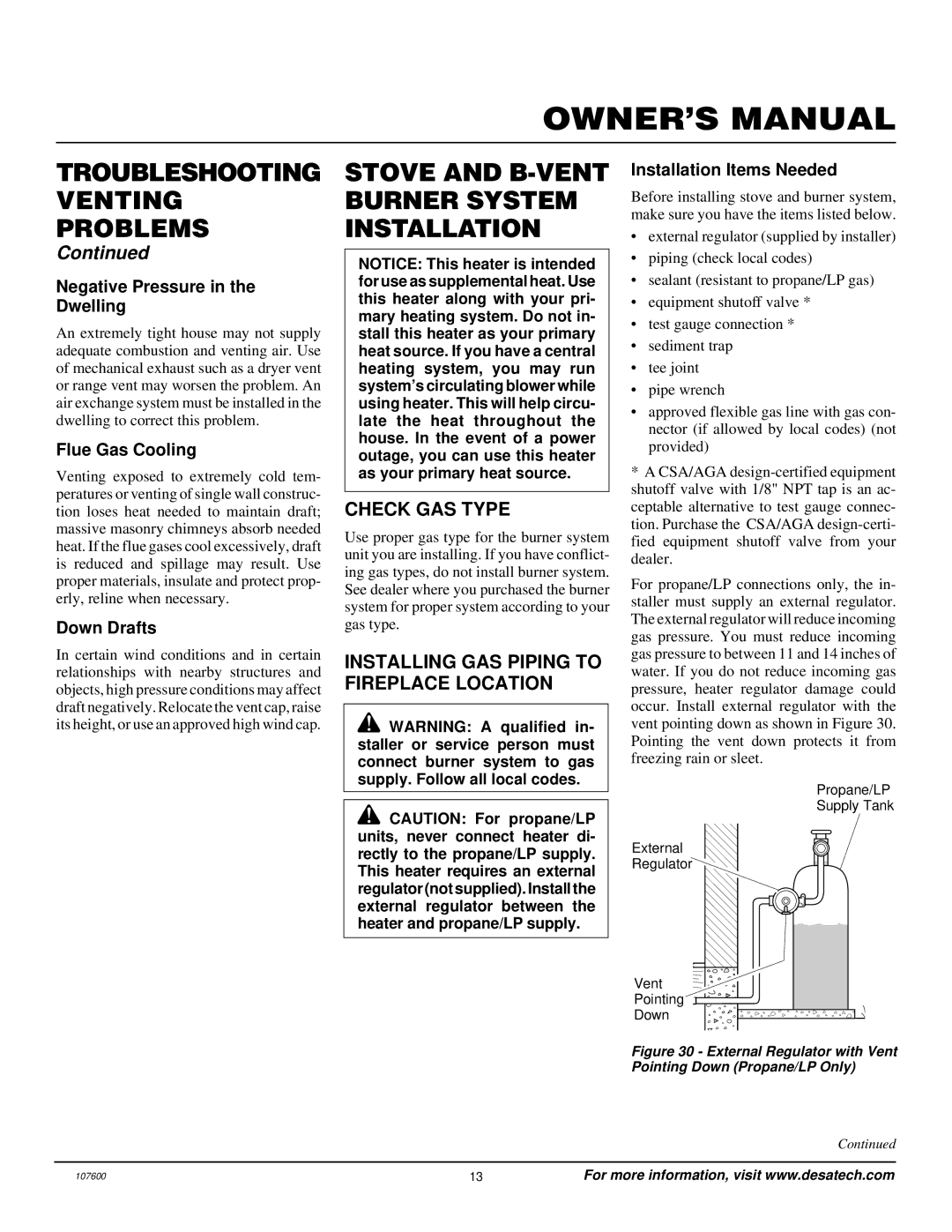
OWNER’S MANUAL
TROUBLESHOOTING VENTING PROBLEMS
Continued
Negative Pressure in the Dwelling
An extremely tight house may not supply adequate combustion and venting air. Use of mechanical exhaust such as a dryer vent or range vent may worsen the problem. An air exchange system must be installed in the dwelling to correct this problem.
Flue Gas Cooling
Venting exposed to extremely cold tem- peratures or venting of single wall construc- tion loses heat needed to maintain draft; massive masonry chimneys absorb needed heat. If the flue gases cool excessively, draft is reduced and spillage may result. Use proper materials, insulate and protect prop- erly, reline when necessary.
Down Drafts
In certain wind conditions and in certain relationships with nearby structures and objects, high pressure conditions may affect draft negatively. Relocate the vent cap, raise its height, or use an approved high wind cap.
STOVE AND B-VENT BURNER SYSTEM INSTALLATION
NOTICE: This heater is intended for use as supplemental heat. Use this heater along with your pri- mary heating system. Do not in- stall this heater as your primary heat source. If you have a central heating system, you may run system’s circulating blower while using heater. This will help circu- late the heat throughout the house. In the event of a power outage, you can use this heater as your primary heat source.
CHECK GAS TYPE
Use proper gas type for the burner system unit you are installing. If you have conflict- ing gas types, do not install burner system. See dealer where you purchased the burner system for proper system according to your gas type.
INSTALLING GAS PIPING TO FIREPLACE LOCATION
![]() WARNING: A qualified in- staller or service person must connect burner system to gas supply. Follow all local codes.
WARNING: A qualified in- staller or service person must connect burner system to gas supply. Follow all local codes.
![]() CAUTION: For propane/LP units, never connect heater di- rectly to the propane/LP supply. This heater requires an external regulator (not supplied). Install the external regulator between the heater and propane/LP supply.
CAUTION: For propane/LP units, never connect heater di- rectly to the propane/LP supply. This heater requires an external regulator (not supplied). Install the external regulator between the heater and propane/LP supply.
Installation Items Needed
Before installing stove and burner system, make sure you have the items listed below.
•external regulator (supplied by installer)
•piping (check local codes)
•sealant (resistant to propane/LP gas)
•equipment shutoff valve *
•test gauge connection *
•sediment trap
•tee joint
•pipe wrench
•approved flexible gas line with gas con- nector (if allowed by local codes) (not provided)
*A CSA/AGA
For propane/LP connections only, the in- staller must supply an external regulator. The external regulator will reduce incoming gas pressure. You must reduce incoming gas pressure to between 11 and 14 inches of water. If you do not reduce incoming gas pressure, heater regulator damage could occur. Install external regulator with the vent pointing down as shown in Figure 30. Pointing the vent down protects it from freezing rain or sleet.
Propane/LP
Supply Tank
External
Regulator
Vent
Pointing
Down
Figure 30 - External Regulator with Vent Pointing Down (Propane/LP Only)
Continued
107600 | 13 | For more information, visit www.desatech.com |
